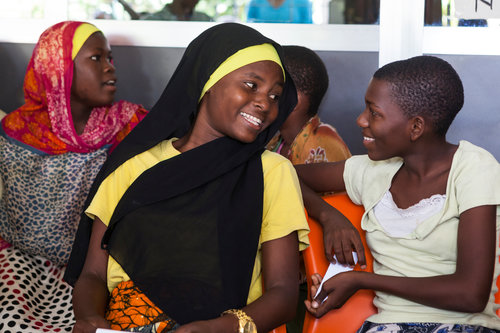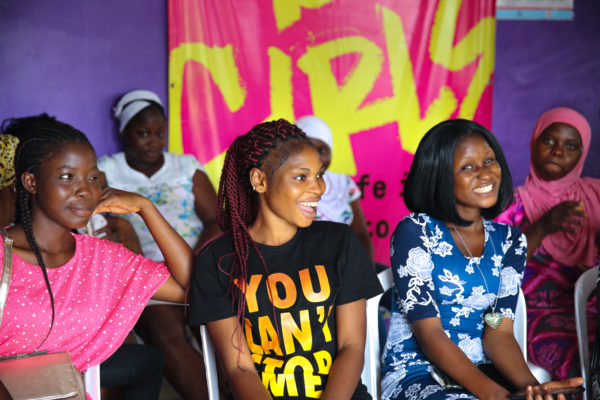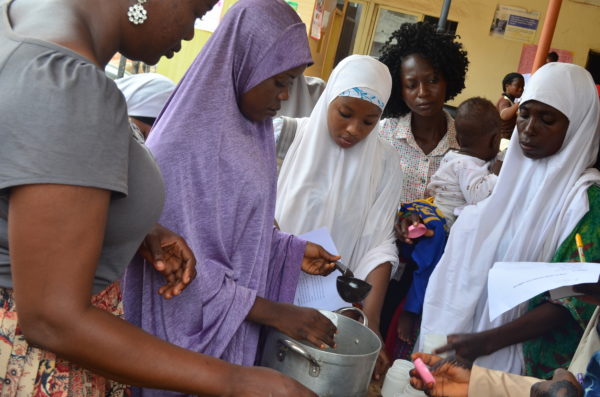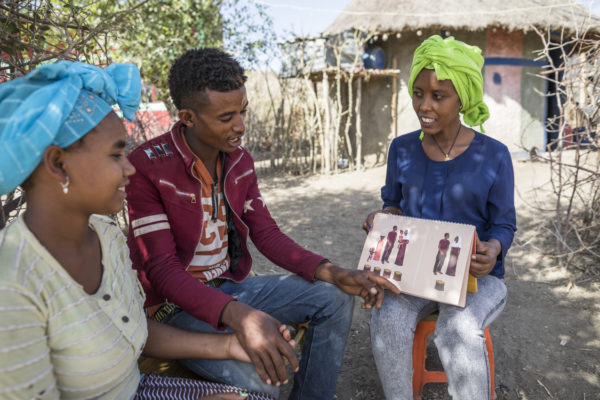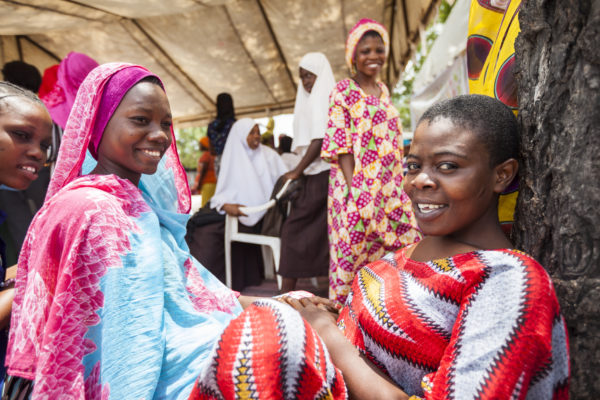Manya Dotson: Human dignity, equity and empowerment are fundamental values in public health. PowerPoints, graphs and data capture meaningful information, but too often lose the empathetic connection to the people we serve. That leads us to make decisions that might “miss the mark.” HCD gives us a problem solving process that helps us get inside of girls’ emotional experiences and design health services that make girls feel seen, heard and understood.
KSS: HCD is the backbone of A360’s design and development process. How has HCD helped A360 pair an emotional connection to the body of evidence?
MD: A360 kicked off with a review of existing research and evidence and then said: “let’s go deeper.” Working in equal partnership with our young designers, we spent a couple of months exploring the interpersonal dynamics and contextual factors influencing girls’ everyday lives across Nigeria, Tanzania and Ethiopia. We then test-drove concepts with girls in real-life circumstances to see their responses, applying the things that worked in communities across each country. Every step of the way, we have continually refined and honed in on activities that girls love and want. In January 2018, we launched an adaptive implementation phase; we’re scaling our solutions powered by girls’ insights and responsive to their needs.
KSS: What are some of the breakthrough insights that have come out through the HCD process?
MD: Many girls told us that they don’t identify as sexually active. But rather, “he is having sex with me.” In response, A360 uses goal-setting as an entry point to engage with girls, all while divorcing contraceptives from the decision to be sexually active. In Ethiopia, we approach contraceptive counseling through financial planning. In Tanzania and Nigeria, we offer vocational and skills training that leads to private counseling with trained providers.
“HCD helps us get inside of girls’ emotional experiences to design health services that make girls feel seen, heard and understood.”— Manya Dotson, A360 Project Director
We’ve also learned that not every girl dreams of finishing school—or even if she dreams about it, she, practically, doesn’t see it as her next step. Motherhood, for many, is the clearest path to meaning and value. It’s something girls truly look forward to. A360’s country-specific interventions frame contraception as a means for girls to achieve their dreams, no matter the form. “You sound like a girl with a plan,” we say. “Contraceptives can be part of that plan.”
Adolescents are focused on immediacy. It’s a missed opportunity anytime that there is a delay between exciting a client and then offering a service. We meet girls where they are at by offering services in the communities that they live in. All A360 activities incorporate opt-out private moments with trained providers to remove the stigma surrounding contraceptives and ensure every girl can engage in counseling as she feels comfortable.
KSS: A360 is recording results that go against what the evidence might otherwise suggest. Tell us more.
MD: In Ethiopia, we’re working with remote married girls. There, the cultural imperative to prove one’s fertility after marriage is strong. The evidence indicated that maybe we shouldn’t work with girls directly after they wed, as it would be too hard to overcome this cultural norm.
Yet through HCD’s discovery activities, we learned that young Ethiopian couples are concerned about a changing economy that is increasingly cash-based. They feel that having a smaller family is a path to a better life and more wealth. We thought: what if we, instead, frame our programming as financial counseling for young and new couples? A360 Ethiopia’s Smart Start program supports married girls and their husbands in thinking through the cost of having a baby—of, say, what would happen if they had a cow first before having baby. They could earn some cash from selling milk, and the family could be more comfortable.
We are seeing that more than one in two married girls in Ethiopia who interact with A360 leaves with contraception. And despite the cultural expectations to begin a family immediately after marriage, half who take up a method do not have any children yet. They will get those cows. This is life-changing!
KSS: As A360 expands, how are you spreading these insights across each of the three intervention countries—and beyond?
MD: We work closely with public health and government officials in providing training and communication overlays to help reconfigure a system that already exists. We’re doing these minor but major differences in execution, which create different—and impactful—results.
We’re sharing A360’s findings widely. If there is anything you can learn from A360 then, please, take it. Perhaps that’s just asking yourself to remember what it felt like being an adolescent. Shifting our mindset, and leveraging design models that work in partnership with young people can help each of us to step back into adolescents’ shoes to design solutions responsive to their needs.
Eager to learn more? You can listen to the full Q&A here.
Adolescents 360 (A360) is a four-and-a-half year initiative co-funded by the Bill & Melinda Gates Foundation and the Children’s Investment Fund Foundation (CIFF). The project is led by Population Services International (PSI) together with IDEO.org, University of California at Berkeley Center on the Developing Adolescent, the Society for Family Health Nigeria, and Triggerise. The project is being delivered in Ethiopia, Nigeria and Tanzania, in partnership with local governments, local organizations, and local technology and marketing firms. In Tanzania, A360 is building on an investment and talent from philanthropist and design thinker Pam Scott.

